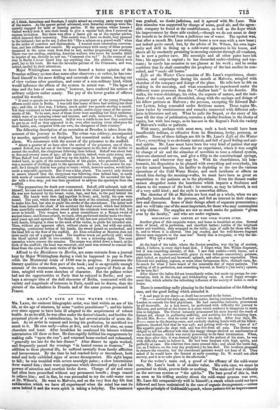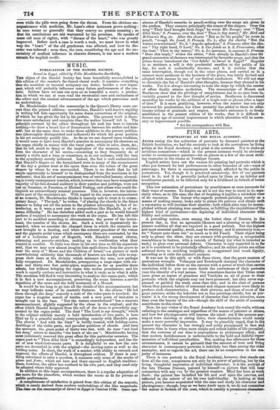MR. LANE'S LIFE AT THE WATER CURE.
MB. LANE, the eminent lithographic artist, was bled within an ace of his life, at the age of nineteen' by some "active practitioner"; and his habits ever since appear to have been ill adapted to the acquirement of robust health. As an invalid, he was often under the doctor's hands • and besides the perpetual physic of a valetudinarian, he had several attacks of acute dis- ease. As an artist in request and loving his profession, he sacrificed too much to it. He rose early----often at five, and worked till nine, on some chocolate and toast. After breakfast he continued his labours without intermission till three or four. He then rapidly fulfilled his engagements by making calls "upon the run"; and returned home excited and exhausted, "generally too late for the late dinner." After dinner he again worked, and frequently passed the evenings "in heated rooms or theatres." In addition to these physical ills, he suffered mentally from family affliction and bereavement. By the time he had reached forty or thereabout, both mind and body exhibited signs of severe derangement. His sight began to fail; he was troubled with severe neuralgic pains ; a slow intermittent fever wasted him ; there were symptoms which threatened palsy ; and his powers of attention and exertion broke down. Change of air and scene had often been prescribed without any permanent benefit ; drugs ceased to relieve him ; and in fine, he was persuaded to try the cold-water cure at Dr. Wilson's. He went to Malvern, and on the very first day felt that exhilaration which we have all experienced when the mind has cast its cares behind it and the worn spirit is taking a holyday. The treatment was gradual, no doubt judicious, and it agreed with Mr. Lane. This first stimulus was supported by change of scene, good air, and the agree- able company he found at the establishment, as well as the hope which
his improvement by these aids excited,—though we do not mean to deny the benefit to be derived from a judicious use of water. The upshot was,
that after a month Mr. Lane returned home a new man with a new lease; not indeed quite cured, but, by the advice of Dr. Wilson, his own inge- nuity and skill in fitting up a cold-water apparatus in his house, and above all by resolutely persisting in morning exercise through all weathers, he is now a perfect cure. His neuralgic and all other pains have left him ; his appetite is capital ; he has discarded under-clothing and top- coats ; he rarely has occasion to use glasses at his work ; and he seems confident that Ile shall contradict the prophecy of the last medico he con- sulted, and "snake old bones."
Life at the Water Cure consists of Mr. Lane's experiences, obser- vations, and outpourings during his month at Malvern, mingled with sketches of the company and doings of the place. He tells how he felt on waking in the morning, and what sensations he experienced under the different water processes from the " shallow bath " to the douche. His walks, his water-drinkings, his rides, the aspects of nature, and the inci- dents of the road, are all chronicled, along with the sayings and doings of his fellow patients at Malvern ; the persons, excepting Sir Edward Sal- wer Lytton, being concealed under fictitious names. These topics Mr. Lane varies by reminiscences and remarks connected with different sub- jects in literature and art. What he calls the Sequel, or the story of his case till the time of publication, contains a similar freedom in the choice of topics, but with less range, as he has not in the Regent's Park the variety of Malvern's walks or patients.
With many, perhaps with most men, such a book would have been insufferably tedious, or offensive from its flimsiness, levity, pertness, or artifice. None of these failings are felt in Mr. Lane's Life at the Water Cure; everything is so obviously natural, and full of good feeling and ani- mal spirits. Mr. Lane must have been the very kind of patient that any medical man would have chosen for an experiment, where it was sought by change of air and the stimulus of novelties to tone a relaxefl system, renovate shattered nerves and give a fillip to the constitutional springs, whatever and wherever ;hey may be. With his cheerfulness, his bon- hommie, his disposition to be pleased with everything and everybody, his eye for natural beauties, his facility in depicting to the eye the various operations of the Cold Water House, and such incidents or effects as struck him during the morning-walks, he must have been as great an acquisition to the patients as to the physician. Even the distant reader cannot altogether resist the heartiness which imparts a freshness and charm to the manner of the book : its matter, as may be inferred, is not of a very solid kind ; and the style is somewhat diffuse.
The sketches of life at Malvern are best read as a whole, when we are gradually introduced to the persons, and feel an interest in their charac- ters and discourse. Some of their doings admit of separate presentation; and we will take one of the most important, for those who,may contemplate a trip thither. The supplies are not so much amiss for patients "given over by the faculty," and who are under regimen.
BREAKFAST AND DINNER AT THE COLD WATER CURE.
Another glass of this exquisite water, and home to breakfast at nine. Severs/ sorts of bread, all in perfection, and excellent butter; bottles of the brightest water and tumblers, dhly arranged on the table. jugs of milk for those who like it, and to whom it is allowed. One jug smokes, and the well-known fragrant flavour soon suggests to the nose tea! Surely this is irregular, or why the dis- guise? Why not a teapot ?
• At the head of the table, where the Doctor presides, was the leg of mutton, which, I believe, is every day's head dish. I forget what Mrs. Wilson dispensed, but it was something savoury, of fish. I saw veal cutlets—with bacon, and a companion dish, maccarom—with gravy (a very delicate concoction); potatoes, plain boiled, or mashed and browned; spinach and other green vegetables. Then
followed rice .pudding, tapioca or some other us ditto, rhubarb tarts, Ste. So much for what I have heard of the miserable diet of water patients. The cooking of all is perfection, and something beyond, in Neddy's [his son's] opinion, for he eats fat !
After dinner the ladies did not immediately retire, but made up groups for con- versation, both in the dining and withdrawing room. A most happy. ment this, which admits the refreshing influence of the society of ladies en house.
There is something sadly pleasing in the fatal termination of the following case, and the good feeling which attended it.
"A sad page in my diary—a death has occurred in the house. "Mr. —arrived ten days ago, without notice, having journeyed from Norfolk to London to consult the first physicians. He had cancerous tumours, pronounced by all incurable. As a last resort, he performed with difficulty the journey to Malvern, and arrived at the house in a state which rendered it dangerous to mow him to lodgings. The Doctor instantly pronounced his state beyond the reach of human alit, except in palliating suffering, and soothing his few remaining days. He told Mrs. B— that he could not survive ten days. After four days, Mr. B— came to the drawing-room, and cordially shaking hands with all his fellow- patients, thanked God that he was safe, and getting well—he was 'sure of it His appetite good—he slept well, and was free from all pain. The Doctor WU obliged to telr his afflicted wife that this happy change showed no amelioration of the actual disease which was surely proceeding to its fatal termination. When, some days after this, it was deemed right to tell the patient of his state, he will with difficulty made to believe it. He had been buoyant with high spirits, and or, as I believe, on the very day predicted,) he has died. The brothers proposed to at ease. His relatives then came around him; and about the tenthvdzi to remove the remains, but the considerate patients would not hear of it. They asked if he would have the funeral at early morning: Dr. W. would not allow secrecy, and it is to take place in the afternoon."
For the writer's main end, a proof of the efficacy of the cold-water cure, Mr. Lane's book is of slender value. His own case, we must be permitted to think, proves little or nothing. The main evil was evidently on the nervous system or "the spirits." The best proof of this is, that as soon as his trifling anxiety about the cold-water process was over, Mr. Lane felt comparatively well in himself; a result which could not have followed and been maintained in the case of organic derangement,—unless upouthe principle of Goldsmith's quack, whose patients felt an improvement even while the pills were going down the throat. From his obvious un- acquaintance with medicine, Mr. Lane's other instances prove nothing : he uses terms so generally that they convey no precise meaning ; so that his conclusions are not warranted by his premises. He speaks of some old man of eighty, with "disease of the heart," who was greatly improved. Before such a case is worth a rush, we must know in what way the " heart " of the old gentleman was affected, and how its dis- order was interred: even then, the case, considering the age and the un- certainty of medical inference in obscure diseases, is too near a modern miracle for implicit credit.



























 Previous page
Previous page